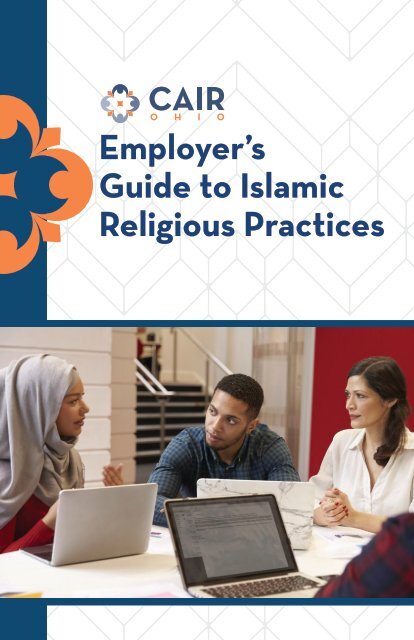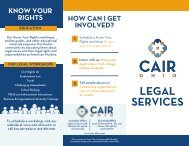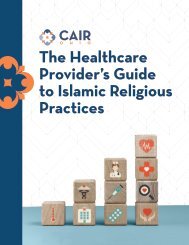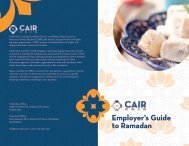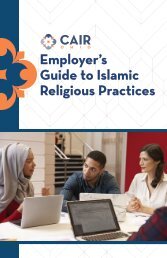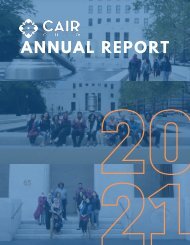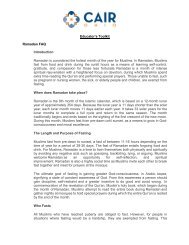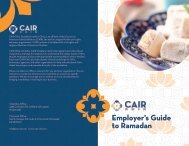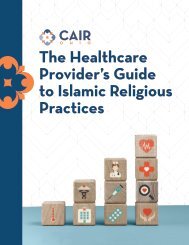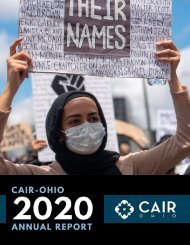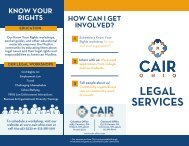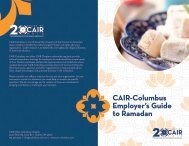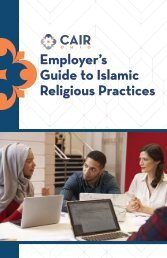CAIR-Ohio Employer's Guide to Religious Practices
Create successful ePaper yourself
Turn your PDF publications into a flip-book with our unique Google optimized e-Paper software.
Employer’s<br />
<strong>Guide</strong> <strong>to</strong> Islamic<br />
<strong>Religious</strong> <strong>Practices</strong>
Employer’s <strong>Guide</strong> <strong>to</strong> Islamic <strong>Religious</strong> <strong>Practices</strong><br />
<strong>CAIR</strong>-<strong>Ohio</strong>, founded in 1998, is an affiliate of the Council on American-Islamic<br />
Relations (<strong>CAIR</strong>), the largest American-Muslim civil rights organization in<br />
the U.S. <strong>CAIR</strong> is headquartered in Washing<strong>to</strong>n, DC and has 32 chapters<br />
nationwide. <strong>CAIR</strong>-<strong>Ohio</strong> has chapters in Columbus, Cleveland, and Cincinnati,<br />
and regularly conducts diversity trainings for businesses who want <strong>to</strong> learn<br />
more about interacting with their Muslim employees and about potential<br />
religious accommodations in the workplace.<br />
Demographers say that Islam is one of the fastest growing religions<br />
in the United States. American Muslims are now found in all sec<strong>to</strong>rs<br />
of society. This growing Muslim population adds a new dimension for<br />
consideration by employers when dealing with issues of multiculturalism<br />
and diversity. The information contained in this booklet is designed <strong>to</strong> assist<br />
employers in formulating and implementing policies that will help create a<br />
culturally-sensitive workplace environment. It will also serve as a guide <strong>to</strong><br />
understanding religiously-mandated practices of Muslim employees. The<br />
information contained in this guide outlines general Islamic beliefs and<br />
practices. Individual application of these observances may vary based on<br />
culture, denomination, level of observance and personal practice.<br />
Glossary of Muslim Terms<br />
Eid: A day of festivity; major religious holiday.<br />
Halal: Permissible under Islamic law.<br />
Hij’ab: Clothing Muslim women wear in public. It is generally<br />
loose-fitting and includes a head covering.<br />
Jum ‘ah: Friday congregational prayer, the Muslim weekly<br />
worship service.<br />
Kufi: A cap sometimes worn by Muslim men.<br />
Qur’an: Islam’s scripture, sometimes spelled as Koran.<br />
Ramadan: The month of fasting.<br />
Hajj : Pilgrimage <strong>to</strong> the city of Mecca<br />
Wudu: The practice of ritual washing by Muslims before daily prayer<br />
Salah: The ritual prayer of Muslims, performed five times daily<br />
1
U. S. Legal Protections of <strong>Religious</strong> Rights<br />
Observances such as prayer, fasting, pilgrimage, and religious celebrations<br />
are practices of members of the Muslim faith. Such expressions<br />
are protected by the following provisions in the U.S. Constitution and<br />
Federal law:<br />
• The First Amendment <strong>to</strong> the Constitution of the United States,<br />
which protects the free exercise of religion by public employees.<br />
• Title VII of the 1964 Civil Rights Act, which provides that an<br />
employer may not discriminate against a person because he/she<br />
adheres <strong>to</strong> a particular faith, and that employers must accommodate<br />
an employee’s religious practices unless doing so would<br />
cause undue hardship <strong>to</strong> the employer. This provision applies <strong>to</strong><br />
both public and private employees.<br />
Moreover, <strong>Ohio</strong> law also contains similar provisions protecting<br />
religious rights of employees at work. In fact, the <strong>Ohio</strong> Constitution<br />
provides more protection for religious practice at work than the U.S.<br />
Constitution and Federal law.<br />
• Article 1, Section 7 of the State of <strong>Ohio</strong> Constitution prohibits<br />
laws that interfere with the rights of conscience of public<br />
employees. This provision of the <strong>Ohio</strong> Constitution mandates<br />
that the religious practice of all public employees in <strong>Ohio</strong> be<br />
accommodated by the employer.<br />
• <strong>Ohio</strong> law also has an equivalent <strong>to</strong> Title VII of the 1964 Civil<br />
Rights Act . <strong>Ohio</strong> Revised Code O.R.C. § 4112.02 similarly<br />
provides that an employer may not discriminate against a<br />
person because he/she adheres <strong>to</strong> a particular faith, and that<br />
employer must accommodate an employee’s religious practices<br />
unless doing so would cause undue hardship <strong>to</strong> the employer.<br />
This provision of the <strong>Ohio</strong> Constitution mandates that the<br />
government accommodate religious practices of public<br />
employees.<br />
2
Daily Prayer<br />
Islam urges God-consciousness in an individual’s life. Islam mandates that<br />
Muslims perform five prayers each day at specific times. The exact prayer<br />
timings will fluctuate throughout the year depending on the season. If<br />
necessary, employers can consult a yearly prayer time calendar in order<br />
<strong>to</strong> schedule shifting break times that will allow employees <strong>to</strong> pray within<br />
the required time frames. Prayer, also called salah, generally occurs at the<br />
following times:<br />
1. Morning prayer occurs before break-of-dawn.<br />
2. Noon prayer occurs after midday.<br />
3. Afternoon prayer occurs in late afternoon.<br />
4. Sunset prayer occurs just after sunset.<br />
5. Night prayer occurs around late evening.<br />
Muslims are required <strong>to</strong> be in a state of cleanliness, or wudu, in order <strong>to</strong><br />
perform prayer. Thus, before prayer Muslims will need <strong>to</strong> use the restroom in<br />
order <strong>to</strong> wash their faces, hands and feet with clean water. During the act of<br />
worship, Muslims stand, bow and <strong>to</strong>uch the forehead <strong>to</strong> the ground. Worship<br />
may be performed in any quiet, dry, clean place. During prayers, the worshiper<br />
will face <strong>to</strong>ward Mecca (northeast in <strong>Ohio</strong>). Other workers should not walk in<br />
front of or interrupt the worshiper during the prayer. During prayer, a Muslim<br />
is fully engaged. They will not respond <strong>to</strong> a ringing telephone or conversation.<br />
Fellow employees should not take offense if the worshipper does not answer<br />
them during prayer. However, in case of an emergency, they will respond <strong>to</strong> an<br />
announcement by s<strong>to</strong>pping the prayer immediately.m s<strong>to</strong><br />
3
Time and Scheduling Considerations<br />
The time it takes <strong>to</strong> perform the washing and prayer is usually about 5<br />
<strong>to</strong> 15 minutes. This enables the Muslim employee <strong>to</strong> pray during meal<br />
and/or other break times. Flexibility in taking breaks can allow employees<br />
<strong>to</strong> pray within the prescribed time period for prayer. For example:<br />
• Employees working regular day hours may schedule their breaks <strong>to</strong><br />
fit noon and afternoon prayer - depending on location - between<br />
noon and 5 p.m.<br />
• Shifts from 10 a.m. <strong>to</strong> 6 p.m. may require Muslim employees <strong>to</strong><br />
perform noon, afternoon and sunset prayers in the workplace in<br />
some states, especially during winter.<br />
• Night shift workers may need <strong>to</strong> pray sunset, night and morning<br />
prayers on site. In other more controlled work environments,<br />
employers must work out a reasonable arrangement so employees<br />
can pray within the prescribed time period.<br />
Friday Congregational Prayer<br />
Friday is the day for congregational worship, called Jum’ah. The prayer<br />
generally takes place at a mosque during the noontime prayer and<br />
includes a sermon. A Muslim employee should be able <strong>to</strong> complete<br />
Friday prayers during an extended lunch break or by combining their<br />
other breaks. Any work missed may be made up by either staying later<br />
or coming in earlier, or through whatever arrangements are mutually<br />
satisfac<strong>to</strong>ry.<br />
4
Muslim Holidays<br />
Islamic holidays and festivals follow the lunar calendar. Like the solar<br />
calendar, the lunar calendar has twelve months. However, a lunar month,<br />
which is marked by the appearance of a new crescent in the horizon, may<br />
last only 29 days. A lunar year is about eleven days shorter than the solar<br />
year. This means that Islamic festivals occur about eleven days earlier each<br />
year. There are several days on the Islamic calendar of special religious<br />
significance.<br />
Eid (Day of Festivity) is celebrated by Muslims twice a year. The first Eid<br />
is celebrated after the end of the month of fasting, called Ramadan. The<br />
second Eid is celebrated beginning on the tenth day of the twelfth Islamic<br />
month. The festivals include congregational prayers, family visitations<br />
and exchange of gifts. Celebrating Eid requires that Muslims take time<br />
off, at least, twice every year. There should be no undue penalty for this<br />
religious obligation. Employers should work with Muslim employees <strong>to</strong> make<br />
arrangements which would allow Muslim employees <strong>to</strong> take time off for Eid.<br />
Ramadan Fast<br />
The month of Ramadan, the ninth month of the Islamic lunar calendar, is the<br />
period in which Muslims are required <strong>to</strong> fast. Observing Ramadan means<br />
refraining from eating, drinking and smoking from break-of-dawn <strong>to</strong> sunset.<br />
Ramadan is a period of personal restraint and renewed focus on moral<br />
conduct. It is also a time <strong>to</strong> empathize with those who are less fortunate and<br />
<strong>to</strong> appreciate what one has. Fasting does not mean that Muslims cease <strong>to</strong><br />
work. Some Muslim employees who work in physically demanding jobs may<br />
require less physically taxing work duties during the month of fasting.<br />
An employee observing the fast will not be able <strong>to</strong> eat during typical lunch<br />
times. However, he or she will need <strong>to</strong> eat after sundown, and/or, for those<br />
working night shifts, before dawn. Mutually convenient adjustments should<br />
be made. For example, a work shift could be shortened by the length of the<br />
lunchbreak if the break is not taken.<br />
5
Pilgrimage<br />
Pilgrimage plays a significant role in many faiths. In Islam, it is one of the five<br />
“pillars,” or basic obligations, of the religion. Muslim adults are required <strong>to</strong> go on<br />
a pilgrimage, also known as Hajj, <strong>to</strong> the city of Mecca, Saudi Arabia at least once<br />
in their lifetime if they are financially and physically able. Performing the rituals<br />
of the pilgrimage, at a minimum, will take five days during the second week of<br />
the twelfth month of the lunar calendar. However, considerable variations exist<br />
in trip arrangements, and group travel may take 10-21 days. Muslim employees<br />
may choose <strong>to</strong> make pilgrimage using vacation or unpaid time off.<br />
Dietary Requirements<br />
The Qur’an, Islam’s revealed text, prohibits the consumption of alcohol, pork,<br />
and pork byproducts. Practicing Muslims are careful about the food they<br />
consume and about how it is prepared. Many practicing Muslims follow<br />
certain standards of slaughter and preparation of meat and poultry, called halal<br />
(permissible), which is similar <strong>to</strong> Jewish kosher standards. Airline companies and<br />
other parties that serve food <strong>to</strong> Muslims may order these special items (mainly<br />
meats) from certified halal food providers. If this is not possible, employees<br />
should be given choices that meet Muslim dietary requirement (such as<br />
vegetables, eggs, milk and fish).<br />
6
Appearance<br />
Islam prescribes that both men and women behave and dress modestly.<br />
Muslims believe men and women should be valued and judged on their<br />
intelligence, skills and contributions <strong>to</strong> the community, not on their physical<br />
attributes. There are a number of ways in which Muslim men and women<br />
express such teachings.<br />
Men: Many Muslim men keep beards for religious reasons. Should there be<br />
safety and health considerations, employers may require employees with<br />
beards <strong>to</strong> use proper covering such as hair nets or masks. Also, some Muslim<br />
men may wear a small head covering, called a kufi.<br />
Women: When in public, Muslim women wear loose-fitting, non-revealing<br />
clothing. Many Muslim women wear attire known as hijab. This attire, which<br />
may vary in style, usually includes covering the hair, neck and body, except<br />
for the face and hands. Some Muslim women may wear a face veil.<br />
Companies may ask that clothing be clean and neat. Businesses with<br />
designated uniforms may request that the Muslim worker’s attire adhere<br />
<strong>to</strong> certain requirements of fabric, color and style that are consistent with<br />
corporate image. Employers should modify dress code policies so that<br />
religiously-mandated attire is addressed as a diversity issue. For example,<br />
many corporations have a policy forbidding the wearing of “hats.” This rule<br />
should be amended <strong>to</strong> exempt items such as head scarves, skullcaps and<br />
religious attire of other religions.<br />
7
Other Considerations<br />
Shaking Hands: Some Muslims will be reluctant <strong>to</strong> shake the hand of an<br />
unrelated person of the opposite sex. This should not be taken as an insult,<br />
but as a sign of personal modesty.<br />
Eye Contact: The Qur’an teaches Muslim men and women <strong>to</strong> “lower their<br />
gaze” when communicating with unrelated persons of the opposite sex. In<br />
observing this teaching, some Muslims avoid sustained eye contact. This<br />
should not be taken as an insult or as an indication of an unwillingness <strong>to</strong><br />
communicate.<br />
Social/Work Events: Many Muslims are reluctant <strong>to</strong> take part in social<br />
gatherings celebrating religious holidays of other faiths or where alcohol<br />
is served. These employees should not be penalized for not participating<br />
in these events. A Muslim employee should not be asked <strong>to</strong> serve or sell<br />
religiously prohibited products, such as alcoholic beverages or pork.<br />
8
Some Examples of Impermissible<br />
Employer Discrimination<br />
In a study of EEOC (Equal Employment Opportunity Commission)<br />
filings and lawsuits from 2009-2015,† EEOC statistics show that<br />
Muslims are disproportionately represented in cases of employment<br />
discrimination with the EEOC. Even though Muslims comprise of less<br />
than 2% of the population in the US:<br />
• 26% of all lawsuits filed by the EEOC were on behalf of Muslims<br />
• 19.6% of all complaints submitted <strong>to</strong> the EEOC came from Muslims<br />
• 25.9% of all religious accommodation lawsuits filed by the EEOC<br />
were on behalf of Muslims<br />
Headscarves and Look Polices<br />
Samantha Elauf, a young Muslim woman, wore<br />
her headscarf <strong>to</strong> an employment interview<br />
with retailer Abercrombie & Fitch in 2008.<br />
Elauf never mentioned her religion, and the<br />
assistant manager conducting the interview<br />
did not ask. After the interview, however, the<br />
assistant manager asked the district manager<br />
about Elauf’s headscarf because she knew<br />
that hats were not allowed. She had assumed<br />
the scarf was for religious purposes and was not sure whether it would be<br />
permissible on the s<strong>to</strong>re’s floor. She was unequivocally <strong>to</strong>ld not <strong>to</strong> hire Elauf.<br />
Despite scoring high marks on the “competencies” required for the job, Elauf<br />
was denied the position for violating the s<strong>to</strong>re’s “look policy.”<br />
Elauf contacted the Equal Employment Opportunity Commission (EEOC)<br />
and, <strong>to</strong>gether, they sued Abercrombie & Fitch for its discrimina<strong>to</strong>ry hiring<br />
practices. Abercrombie argued that its policy was not discrimina<strong>to</strong>ry because<br />
it prohibited all types of headgear, and so was not based on religion. It<br />
also argued that the burden was on Elauf <strong>to</strong> request accommodation. Title<br />
VII of the 1964 Civil Rights Act provides that employers must provide “reasonable<br />
accommodation” <strong>to</strong> its employees so long as the accommodation<br />
does not cause undue hardship. The U.S. Supreme Court held that employers<br />
must provide such accommodation even if the employee, or prospective<br />
employee did not ask for it.<br />
† Study compiled by Professor Eugene Volokh at UCLA School of Law,<br />
https://www.washing<strong>to</strong>npost.com/news/volokh-conspiracy/wp/2016/06/21/the-eeoc-religiousaccommodation-claims-and-muslims/?utm_term=.aa171c5355e4
Undue Burdens on Employer<br />
Mahad Abass Mohamed and Adkiarim Hassan Bulshale were two Somali<br />
truck drivers for a company called Star Transport. When Star Transport<br />
asked them <strong>to</strong> deliver shipments containing alcohol, they refused and said<br />
their faith would not permit them <strong>to</strong> transport alcohol. Consequently, Mohamed<br />
and Bulshale were fired.<br />
The EEOC sued on their behalf, and Mohamed and Bulshale were awarded<br />
$240,000. Star Transport admitted that it often “swapped loads between<br />
drivers” and that it would not have been difficult <strong>to</strong> accommodate the request.<br />
If there is no undue burden on the employer, it should do its best <strong>to</strong><br />
accommodate the religious needs of its employees.<br />
Beard Policies<br />
Shaheed Khan was awarded $50,000 after McDonalds, his employer, refused<br />
<strong>to</strong> let him wear a beard <strong>to</strong> work. Khan was a crew trainer at a McDonalds in<br />
Fresno, California. In 2005, he asked if he could wear a beard <strong>to</strong> work and<br />
explained his religious reasoning. After he was <strong>to</strong>ld no, he quit.<br />
The EEOC worked out the $50,000 settlement for Khan, and McDonalds<br />
agreed <strong>to</strong> retrain managers about its anti-discrimination policies.<br />
For more information or <strong>to</strong> schedule a diversity training for your business,<br />
contact your nearest <strong>CAIR</strong>-<strong>Ohio</strong> Chapter at www.cairohio.com<br />
10
Columbus Office:<br />
4985 Cemetery Rd.<br />
Hilliard, OH 43026<br />
614.451.3232 | info@cair-ohio.com<br />
www.cair-ohio.com<br />
Cincinnati Office:<br />
7357 E. Kemper Rd, Suite A<br />
Cincinnati, OH 45249<br />
513-281-8200 | info@cair-ohio.com<br />
www.cair-ohio.com<br />
<strong>CAIR</strong>-Cleveland<br />
2999 Payne Ave., Suite 220<br />
Cleveland, OH 44114<br />
216.830.2247 | events@cleveland.cair.com<br />
www.caircleveland.com<br />
<strong>CAIR</strong>-<strong>Ohio</strong> is a chapter of America’s largest Muslim civil liberties and advocacy<br />
organization. Its mission is <strong>to</strong> enhance the understanding of Islam, encourage<br />
dialogue, protect civil liberties, empower American Muslims, and build coalitions<br />
that promote justice and mutual understanding.<br />
© Copyright 2005-2017<br />
Council on American-Islamic Relations


